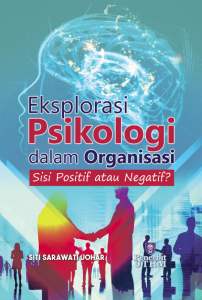EKSPLORASI PSIKOLOGI DALAM ORGANISASI: SISI POSITIF ATAU NEGATIF?
Synopsis
Buku ini menelusur topik-topik merangkumi isu kecerdasan emosi, personaliti, estim kendiri, komitmen, tadbir urus modal insan, kepimpinan insan dan interaksi ilmu psikologi. Penulis juga membincangkan perkaitan isu-isu itu dengan disiplin ilmu psikologi oleh Imam Al-Ghazali dari perspektif agama Islam. Dalam setiap organisasi walau di peringkat apa pun sangat memerlukan pemimpin yang berwibawa dan pengikut yang dinamik selaras dengan tuntutan agama. Organisasi yang mapan dan mampan berupaya membantu mewujudkan modal insan positif dalam masyarakat berkualiti sebagai kelangsungan ketinggian tamadun dalam sesebuah negara. Isu-isu tersebut turut dibincangkan dari aspek kepentingannya mewarnai senario dalam mana-mana organisasi manusia sebagai proses pembangunan insan yang seimbang, disamping membawa pembaca meneroka implikasi setiap daripadanya dari sisi positif dan negatif. Terdapat juga beberapa teori dan model yang dibincangkan dalam buku ini iaitu seperti Model Empat Cabang Kecerdasan Emosi Mayer dan Salovey (1997); Model Tiga Komponen Komitmen terhadap Organisasi Meyer dan Allen (1991); Teori Personaliti Eysenck (1952); Teori Estim Kendiri Rosenberg (1965) dan Perspektif Ilmu Psikologi oleh Imam Al-Ghazali.
Downloads
References
Ab. Aziz Yusof (2006). Pengurusan sumber manusia: Konsep, isu
dan pelaksanaan. Edisi ke-3. Petaling Jaya: Pearson.
Abdul Kadir Othman (2010). The influence of emotional intelligence
on front-line employees’ job performance in service
business. Thesis of Doctor of Philosophy Administrative
Science and Policy Studies. Universiti Teknologi Mara.
Abdul Latip Talib (2008). Sultan Muhammad al-Fateh – Penakluk
Konstantinopel. Kuala Lumpur: Publishing House.
Ajai Pratap Singh & Avinash D. Pathardikar (2010). Effect of
personality traits and emotional intelligence on leadership
effectiveness. Management Convergence, Vol. 1, No. 1,
-41.
Al-Ghazali (1952). Mishkat Al-Anwar. Terjemahan WHT, Gairdner
(Lahore : Sheikh Muhamad Ashraf).
Al-Ghazali (1974). Mishkat Al-Anwar. Terjemahan Abdul Majid
Khatib. Kelantan Pustaka Aman Press.
Al-Ghazali (1979). Keajaiban hati. Edisi Ke 2. Terjemahan
Nirhickmah. Singapura: Pustaka Nasional.
Al-Ghazali (1988). Ihya’ Ulumuddin. Jilid 1&2. Edisi Ke 3.
Terjemahan Ismail Yakub. Singapura. Pustaka Nasional
Pte. Ltd.
Al-Ghazali (2003). Ihya’ Ulumuddin. Jilid 2&4. Kaherah: Maktabah
as Safa.
Al-Ghazali (2009). Ringkasan Ihya’ Ulumuddin: Terjemahan oleh
Zaid Husein Al-Hamid. Selangor: Darul Nu’man Sdn. Bhd.
Allport, G. W. (1937). Personality: A psychological interpretation.
New York: Holt., Rinehart & Winston.
Ary Ginanjar Agustian (2008). ESQ Emotional spiritual quotient:
rahsia sukses membangun kecerdasan emosi dan spiritual.
Jakarta: Arga Publishing.
Ashforth, B. E., & Humphrey R. H. (1995). Emotion in the
workplace: a reappraisal. Human Relations. 48(2), 97–
Ashkanasy, N.M., Hartel, C.E.J., & Daus, C.S. (2002). Diversity
and emotion: the new frontiers in organizational behavior
research. Journal of Management, 28, 307-338.
Asri Marsidi & Hamrila Abdul Latip (2007). Faktor-faktor yang
Mempengaruhi Komitmen Pekerja di Organisasi Awam.
Jurnal Kemanusiaan Bil.10: Disember.
Azizi Yahaya & Halimah Ma’alip (2010). Estim kendiri remaja.
Skudai: Penerbit Universiti Teknologi Malaysia.
Bandura, A. (1977). Social learning theory. Englewood Cliffs, NJ:
Prentice-Hall, Inc.
Bandura, A. (1994). Self-efficacy. In V.S. Ramachaudran (Ed.),
Encyclopedia of human behaviour (Vol. 4, pp. 71-81).
New York: Academic Press. (Reprinted in H. Friedman
[Ed.], (1998). Encyclopedia of mental health. San Diego:
Academic Press.
Baron, A., & Neuman, H. (1996). Workplace violence and
workplace aggression:evidence on their relative frequency
and potential causes. Aggressive Behavior. 22: 161-173.
Baron, R. A. dan D. Bryne (2000). Social psychology. 9th Edition.
London: Allyn and Bacon.
Baron, R. M dan Kenny, D. A. (1986). The moderator-mediator
variable distinction in social psychological research:
conceptual, strategic, and statistical considerations. Journal
of Personality and Social Psychology. 51(6): 1173-1182.
Barsade, S. G. (2002). The ripple effect: emotional contagion and
its influence on group behavior. Administrative Science
Quarterly. 47: 644–675.
Bass, B.M. (1990). From transactional to transformational
leadership: learning to share the vision. Reprinted from
Organizational Dynamics, Winter.
Baucer, J. C. (2001). The effect of corporate intranet use on
employee self-concept and organizational commitment.
California: University of the Pasific.
Baumeister, R.F. (1993). Self-esteem: the puzzle of low self-regard.
New York: Plenum.
Benjamin R. Palmer & Con Stough (2005). Multi-rater or 360-degree
emotional intelligence assessment. Europe’s Journal of Psychology, North America, Vol.10, No.2. Available at:
<http://ejop.psychopen.eu/article/view/359/263>. Date
accessed: 20 Jan. 2014.
Bishop, J.W. & Scott, K.D. (1997). Employee commitment and
work team productivity. HRMagazine. 11:107-111.
Boyatzis, R. E., Goleman D., & HayGroup (2001). The Emotional
Competence Inventory (ECI). Boston: HayGroup.
Brackett, M. A., & Salovey, P. (2004). Measuring emotional
intelligence with the Mayer- Salovey-Caruso Emotional
Intelligence Test (MSCEIT). In Glenn Geher (Ed.), Measuring
Emotional Intelligence: Common Ground And Controversy.
Hauppauge, NY: Nova Science Publishers.
Brockner Joel (1988). Self-Esteem at work. USA: Lexington Books.
Brown, J. D. (1998). The Self. London: McGraw-Hill.
Bruce L. Katcher & Adam Snyder (2007). 30 reasons employees hate
their managers. USA: American Management Association.
Burns, R. B. (1979). The Self-concept: theory, measurement,
development and behavior. New York: Longman Group
Limited.
Campbell, J. D. (1990). Self-esteem and clarity of the self-concept.
Journal of Personality and Social Psychology. 59: 538-549
1037/0022-3514.59.3.538.
Campbell, D. P. (1991). Campbell leadership index manual.
Minneapolis: National Computer Systems.
Caruso, D. R. (1999). Applying the ability model of emotional
intelligence to the world of work. [On-line]. http://www.
cjwolfe.com/article.dorc2 001, November 2010.
Caruso, D. R., Mayer, J. D. & Salovey, P. (2002). Emotional
intelligence and emotional leadership. In Riggio, R. and
Murphy, S. (Eds.), Multiple Intelligences and Leadership.
Caruso, D.R., Mayer, J.D., & Salovey, P. (2002). Relation of an
ability measure of emotional intelligence to personality.
Journal of Personality Assessment. 79: 306-320.
Caruso, D. R. & Salovey, P. (2004). The emotionally intelligent
manager : how to develop and use the four key emotional
skills of leadership. San Francisco: Jossey-Bass.




